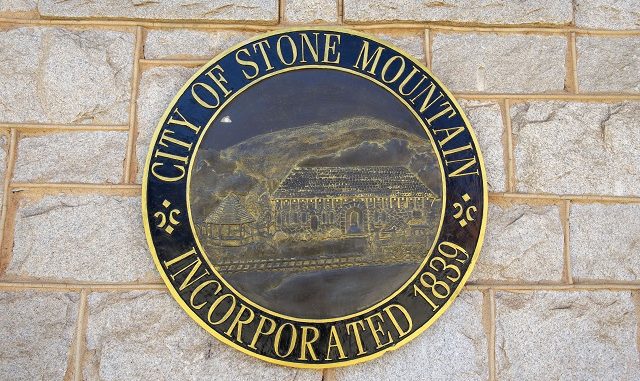
City of Stone Mountain seal on the historic railroad depot. Photo by Dean Hesse.
By Dan Whisenhunt
Following more than three hours of public comments, heated debate and a split vote, the Stone Mountain City Council on June 29 adopted a lower millage rate.
Instead of keeping the current rate, 20 mills which is the highest in DeKalb County according to the Atlanta Journal Constitution, the council adopted the roll-back rate of 17.818.
“The city will bill the same amount of taxes billed last year,” City Manager ChaQuias Miller-Thornton said. “Technically overall there is a zero percent increase in property taxes over last year.”
If the city had kept taxes at 20 mills, the city would’ve received an additional $341,000 in revenue, according to documents attached to the City Council agenda. With 17.818, the city anticipates it will receive $38,000 in additional revenue.
Thornton asked the council to consider the roll back rate, saying the city still has positions it needs to fill and needs to retain police and public works employees. The city also has $8 million in outstanding stormwater projects.
During the required public hearing, residents and property owners blasted city officials, accusing them of not doing anything with the tax money the city already collects. They accused the city of wasting money on projects, like refurbishing a train depot, while neglecting roads and streets.
“The streets in Stone Mountain, all of them have holes anywhere,” resident Dora Prestigiacomo said during the public hearing.
Other commenters promised that anyone who voted to keep the 20 mills rate would face election opposition on Nov. 2.
Stone Mountain City Councilmember Clint Monroe, who has sparred with city officials over a variety of issues in recent weeks, wanted to reduce the rate to 15 mills, which would’ve cost the city about $350,000 in revenue. He later pushed a measure to drop it to 16 mills, an idea that lost in a split vote with Mayor Patricia Wheeler breaking the tie. In addition to Monroe, councilmembers Gina Cox and Shawnette Bryant voted for 16 mills. Council members Diana Hollis, Jasmine Little and Chakira Johnson voted against it.
Johnson made the motion to set the millage rate at 17.818 mills and was supported by Hollis and Little, with the other three council members voting no and Wheeler breaking the tie in favor of the roll-back rate.
Johnson said going lower than that would be “reducing our services to a point we can’t operate.”
The city plans to receive about $2 million in property taxes at 17.818 mills, assuming a 91 percent collection rate.
To see Thornton’s Q&A about the millage rate, click here.
Read the original story on TuckerObserver.com.











